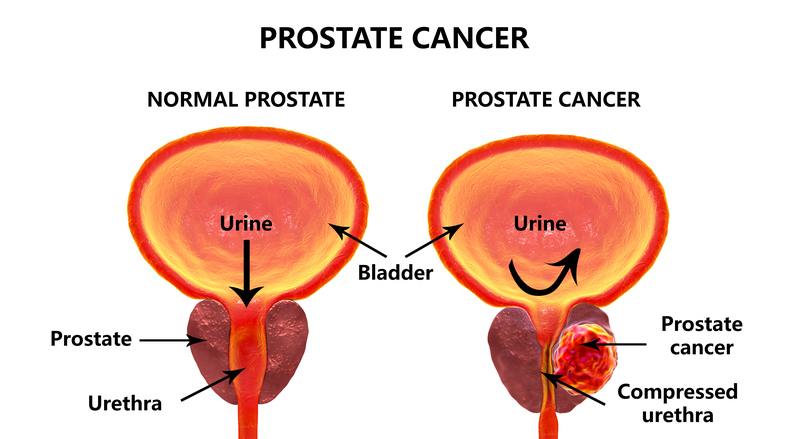
Let’s find out more about screening for prostate cancer along with its risks and benefits. Like all doctors mention, screening is a mere test to look for cancer before you have any symptoms. This process of early detection of the cancer, before the symptoms arise, makes it easier to cure one who is suffering from cancer.
The entire purpose of screening for prostate cancer, or any other type of cancer for that matter, is to eliminate deaths caused due to cancer.
Screening for Prostate is done to find evidence of cancer in men. The two tests that are commonly used to screen prostate cancer include:
- Digital Rectal Examination: The Digital Rectal Examination, also called DRE, is a test in which a doctor checks for any irregularities with the help of a gloved and lubricated finger. The doctor inserts the finger into a man’s rectum and feels the surface of the prostate through the bowel wall.
- Prostate Specific Antigen Blood Test: The PSA Blood Test is done to detect early-stage prostate cancer, especially in men with higher risk factors. This helps in treating them before the cancer gets a chance to grow and spread. This test also has its side effects though. It is said that men with no symptoms of the disease must not get this test done.This is because the PSA Blood Test sometimes finds conditions like BPH instead of prostate cancer. Now, BPH is not otherwise harmful but it can be detected as prostate cancer and that can cause a series of problems for a person who doesn’t actually have prostate cancer. As a result, screening for prostate cancer with the help of the PSA Test may mean that some men will have to go through surgery and other treatments which can cause side effects and thus, affect a man’s normal life.
It is never easy to predict which tumours will grow quickly and which will grow slowly. But, it is also recommended that people must discuss their situation and personal risks with their doctor. If you do not already have a doctor, then you can contact the Lifeline Laboratory and take up your appointment to resolve any of your health issues, including screening for prostate cancer.
Also, in case the test results of your screening for prostate cancer is abnormal, then you will most probably need a prostate biopsy.
Let’s know more about PSA Test. PSA, Prostate-specific antigen, is a protein made by the cells present in the prostate gland. It is also mostly found in semen and in a small amount in the blood. During the PSA Test, the PSA levels in the blood are measure (in nanogram per millilitre). The fact is that with this, the chances of having prostate cancer goes up. The reason behind it is that the PSA level goes up.
- Now, there is no set cutoff point where the doctor can tell if a man has prostate cancer or not. A majority of doctors use 4 ng/mL or higher PSA cutoff point, when deciding if a man needs further testing, while others start at lower levels, at 2.5 or 3. Now, for a test like this, it is necessary that you reach out to the best doctor. We recommend that you must visit the Lifeline Laboratory which is known as one of the best diagnostic centre in Delhi NCR. If not a test, then you must definitely raise your queries with them, only to get a complete and assured guidance for what your next step should be to prevent yourself from Prostate Cancer.
- The reason why the PSA Test is considered risky is that the PSA levels in the body after a PSA Test rise which means that if a man is tested with PSA levels below 4 ng/mL has a chance of increased PSA levels after the test.
- With men that have a higher PSA level, somewhere between 4-10 ng/mL have a 1/4th chance in having prostate cancer. It is also believed that 15% out of men that have PSA levels below 4 ng/mL have a chance of having prostate cancer. With men that have a PSA level above 10 ng/mL, there are almost 50% chances of having prostate cancer.
To know factors that affect the PSA levels in our body to rise, read below:
- Enlarged Prostate: Conditions like BPH (non-cancerous) can cause enlargement of the prostate which further jumps up the PSA levels in our body.
- Old Age: As we grow old, the PSA levels also normally grow even if you don’t have any abnormalities in the prostate.
- Riding Bicycle: Yes, riding a bicycle can cause the PSA levels to rise up. Although for a short time, but it does go up.
- Ejaculation: Ejaculation too can raise the PSA levels. This is why it is recommended that men must obtain from ejaculation a day or two before getting their PSA levels checked.
- Prostatitis: This is a condition more like an infection or inflammation of the prostate gland which further raises the PSA levels.
- Urologic Procedures and Medicines: DRE procedures and taking in male hormones like testosterones can most likely rise the PSA levels.
To know how to avoid raise in PSA levels before a PSA Test or for any health issues, you can reach out to the Lifeline Laboratory in New Delhi. Experts at the laboratory will be able to guide you with the process and its pre-test preparations.
Now, if there are factors that can raise the PSA levels, there are also some factors that work to drop the PSA levels even if a person has cancer. Here are some mentioned below:
- Herbal Ingredient mixtures and other Medicines: Some dietary supplements can cause a dip in the PSA levels in general. Medicines that can cause the PSA levels could include aspirin, drugs that are used to treat BPH or urinary symptoms and other cholesterol-lowering drugs. So, if you are planning to get a PSA Test done, let your doctor know all medications that you are consuming.
For any further queries and information, you can speak with our experts at the Lifeline Laboratory and get your health issues sorted as soon as possible.


